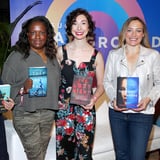
Gillian Flynn paved - nay, frickin' bulldozed - the way for female authors in the psychological thriller genre when she published her bestselling novel Gone Girl in 2012. The story follows Nick Dunne, a man who is suspected of murdering his wife, Amy, when she goes missing on their wedding anniversary. Filled with almost too many shocking twists to count, the book was met with critical acclaim - so much so that an equally as popular film adaptation was released in 2014 with Ben Affleck and Rosamund Pike as the leads.
"She came out of the gate talking about women in a frank and disturbing way we hadn't really seen."
In the seven years since Gone Girl's publication, the novel has continuously inspired other women in the same genre to push the envelope. Four of those said writers - Wendy Walker, Andrea Bartz, Rachel Howzell Hall, and Michele Campbell - shared their insights on Flynn's impactful work and the future of the novel category at POPSUGAR Play/Ground this year. For Bartz, author of The Lost Night, Flynn's portrayal of Amy in Gone Girl provided a much-needed example of giving female characters a gritty edge beneath a veneer of perfection. "She came out of the gate talking about women in a frank and disturbing way we hadn't really seen, and the world was ready for it," Bartz said on the ThrillHER panel at Play/Ground. "Now it feels pretty familiar, but it actually was quite new [back then]."
Hall, author of They All Fall Down, echoed a similar sentiment, noting that Flynn developed the antithesis of the overused "manic pixie girl" character. "We were so tired of that, and finally here's this woman that curses and drinks and plots setting her husband up," Hall said of Gone Girl's leading lady, Amy.
"This genre has allowed writers to explore the female psyche with a new kind of freedom."
Seeing as many novels in the thriller genre focus on male protagonists, Flynn putting Amy's complexities at the forefront was pretty trailblazing and has since driven other writers to give their female characters similar psychological depth, The Night Before author Walker said during the panel discussion. "This genre has allowed writers to explore the female psyche with a new kind of freedom where we can apply all of the psychological conditions and behaviors that originally in suspense were with male characters," she said. "Women were sort of either total crazy sociopaths or detectives or victims, and now they can be so nuanced." Walker is aware that some critics think doing so gives women a bad rap, but she isn't here for the naysayers. "I don't think it's making women look bad. I think it's basically saying there's a whole spectrum of psychological characteristics that apply to men and women. It has nothing to do with gender; it has to do with psychology." Amen to that!
Bartz explained that Flynn "kicked off this new era of domestic noir," driving her, as a single woman in her 30s, to give her thriller a "female-driven" storyline that doesn't revolve around the romance between a man and woman. "There's just as much intrigue and intensity and passion and drama in friendships, for women especially, as there are in romantic relationships," Bartz explained of The Lost Night. "For me, it was really fun to push the genre away from 'Oh, she's the wife who seems to have the perfect marriage but actually doesn't' . . . and push it into exploring all the intense social webs of a single woman."
from POPSUGAR Celebrity https://ift.tt/2xm9tZu
No comments:
Post a Comment